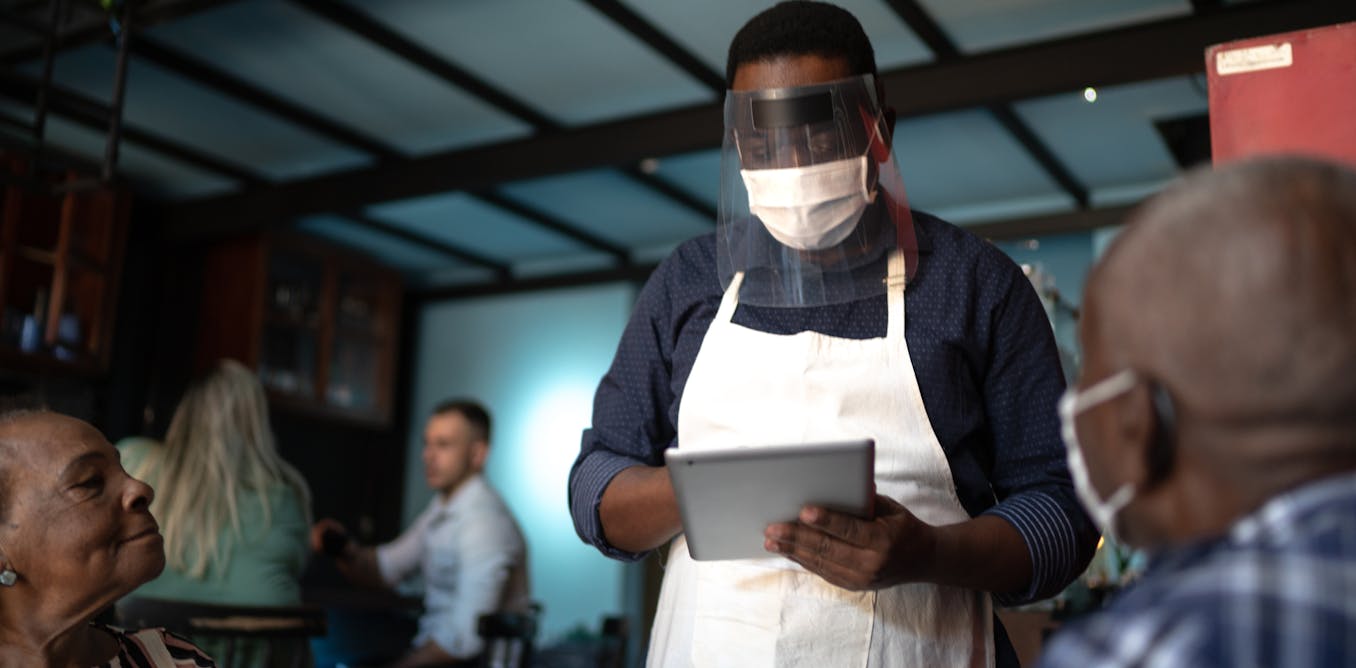The revised guidelines on when and when not to wear masks came as a surprise to many Americans. The Centers for Disease Control and Prevention announced May 13, 2021, that people who are fully vaccinated against COVID-19 can safely enter many indoor settings, such as grocery stores and restaurants, without wearing a mask.
The CDC’s updated guidelines also ask that unvaccinated or partially vaccinated people continue to wear a mask – even in establishments like bars and restaurants, where doing so may no longer be required.
There is good reason to suspect that at least some unvaccinated Americans may violate the CDC’s recommended “honor system” approach. Although the number of Americans who have been vaccinated or plan to be vaccinated against COVID-19 has increased in recent months, many Americans – 34%, according to a recent Kaiser Family Foundation survey – are either on the fence about vaccinating (15%), will vaccinate only if required to do so (6%) or plan to forgo vaccinating altogether (13%).
My colleagues and I conducted research that suggests that many people who plan to refuse a vaccine hold negative views toward scientists and medical experts. Consequently, it seems plausible that unvaccinated people may be unwilling to heed the advice of public health experts at the CDC.
So an important question arises, especially as Memorial Day approaches and people want to be out and about: Can fully vaccinated Americans trust unvaccinated people to wear a mask, even when not required to do so? In a new, demographically representative survey, I find that the answer may be no. ...
The decision, however, has nevertheless raised questions about whether vaccinated Americans can trust unvaccinated people to follow the CDC’s updated guidelines. As CDC director Rochelle Walensky put it, unvaccinated people must be “honest with themselves” about the protective health benefits of wearing a mask.
One concern about the so-called “honor system” approach is that it may allow the virus to circulate among unvaccinated people – a point raised by a major nurses union. If true, increased circulation could enable the virus to continue to mutate. This could potentially lead to the development of variants that are at least partially resistant to existing COVID-19 vaccines.
I studied Americans’ vaccination and mask-wearing intentions in a demographically representative survey of 478 adults in the U.S. on May 17....
About 1 in 5, or 21%, reported that they had not received a COVID-19 vaccine and do not plan to do so. In addition, more than one-quarter (26%) of that 21%, equivalent to about 5% of the total set of respondents, also said that they plan to not wear a mask in indoor spaces like stores and restaurants.
On the other hand, of the 48% who reported being fully vaccinated, a smaller percentage, or 19%, plan to not wear a mask indoors. This means that the proportion of unvaccinated people in my sample who plan to not wear masks indoors is higher than the proportion of vaccinated people who plan to do the same.
Fully vaccinated people may choose to continue to wear a mask indoors because they don’t trust unvaccinated people to follow CDC guidelines.
I find that a slim majority – 54% – of fully vaccinated respondents report that they trust unvaccinated people either “a little” or “not at all” to wear masks in indoor environments. Even though nearly 4 in 5 – or 79% – of fully vaccinated people report that they trust the CDC to “do what is right,” uncertainty about what unvaccinated people choose to do may outweigh those considerations. ...


Recent Comments